What is CAT Exam?
The Common Admission Test (CAT) is India’s most prestigious national level entrance examination, which permits aspirants to get into top management institutes.
There is no doubt that it is the biggest MBA entrance test in the country.
- The IIMs (Indian Institute of Management) conduct this Common Admission Test on a rotational basis.
- CAT Exam 2024 is expected to be held in the last week of November 2024.
- It is a computer-based test that is held in more than 150 cities in India.
- If you are a B-school aspirant planning to take up the IIM Entrance Exam, gear up for your CAT preparation right away, with EduRev's CAT Preparation course.
IIM has designed the CAT Exam Pattern 2024 in such a way that will enable the authority to evaluate future managers in the most effective manner.
Candidates should only look at the updated CAT 2024 in order to comprehend the question paper and make an effective preparation plan.
Continue reading this article to learn more about the CAT Exam Pattern and Syllabus 2024, including the number of questions, time allotted, and paper type.
CAT Exam Pattern 2024: Major Highlights
The CAT Exam 2024 pattern is designed to gauge a candidate's ability to solve mathematical and reasoning problems accurately in the least amount of time.
It will help them understand the structure of the CAT exam question paper and marking scheme to prepare well.
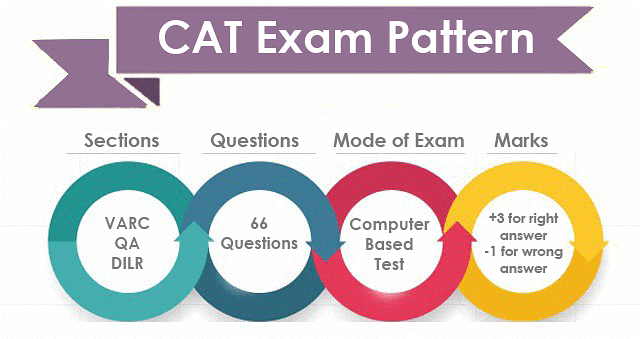
The CAT 2024 Exam was divided into 3 sections each having sectional a time limit of 40 minutes. As of now, no changes have been announced by the conducting authorities for the upcoming CAT exam, so the CAT Exam 2024 is assumed to be based on the same pattern.
- Section 1: Verbal Ability & Reading Comprehension (VARC).
It entails 24 questions and a weightage of 72 Marks. - Section 2: Data Interpretation and Logical Reasoning (DILR).
It consists of 20 questions and a weightage of 60 Marks. - Section 3: Quantitative Aptitude (QA).
It comprises 22 questions and a weightage of 66 Marks.
The exam authorities will release the CAT tutorial for the candidates to familiarise themselves with the CAT Exam Pattern. More details about the CAT Exam Pattern and Marking Scheme are summarized below:
Important Note:
In the year 2019, there were 100 questions in the CAT Exam; in the year 2020, there were 76 questions; and in the years 2021 and 2022, there were 66 questions. There are anticipated to be 66 questions for the CAT Exam 2024 exam as well.
EduRev offers a comprehensive CAT Preparation course that covers all the topics from the CAT syllabus. This material is designed to help the candidate understand the concepts, prepare for the exam, and practice the questions. The material is available in the form of Videos, Documents and Tests.
Check out the CAT Cut Offs from prior years to get a sense of the range of marks you'll need to get in order to advance to the final round of selection.
CAT Exam Pattern 2024: Detailed Section-Wise Pattern
The CAT Exam has a sectional time limit, meaning candidates must complete each section within a designated time frame and cannot switch between sections. The sections must be completed in the following order:
- Section 1: Verbal Ability and Reading Comprehension
- Section 2: Data Interpretation and Logical Reasoning
- Section 3: Quantitative Aptitude
As per the official CAT Exam Pattern, aspirants have to complete each section within the specified time limit and as soon as the time is over, the screen will automatically move to the next section.
No changes or corrections will be allowed at a later stage. The number of questions asked in each section of CAT exam and time allotted to each is summarized in the table below:
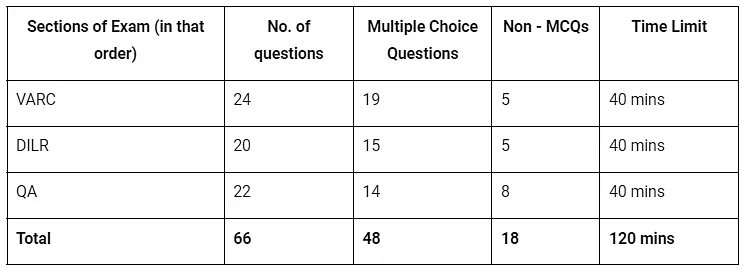

1. Verbal Ability and Reading Comprehension (VARC)
The CAT VARC section is mainly focused to check the English language skills of the candidates and how well they can interpret paragraphs and understand the core ideas.
CAT Syllabus for Verbal Ability and Reading Comprehension (VARC) carries overall 34-36% Weightage in CAT exam.
Common Admission Test (CAT) syllabus for VARC section is divided into 2 parts.
- Reading Comprehension passages and
- Verbal Ability.
Total expected questions in this section are 24 out of total 66 questions.
Among those 24 questions, there are 5-6 Verbal Ability Questions of Non-MCQ type which do not carry negative marking.
A detailed topic-wise distribution of the VARC syllabus is given below:
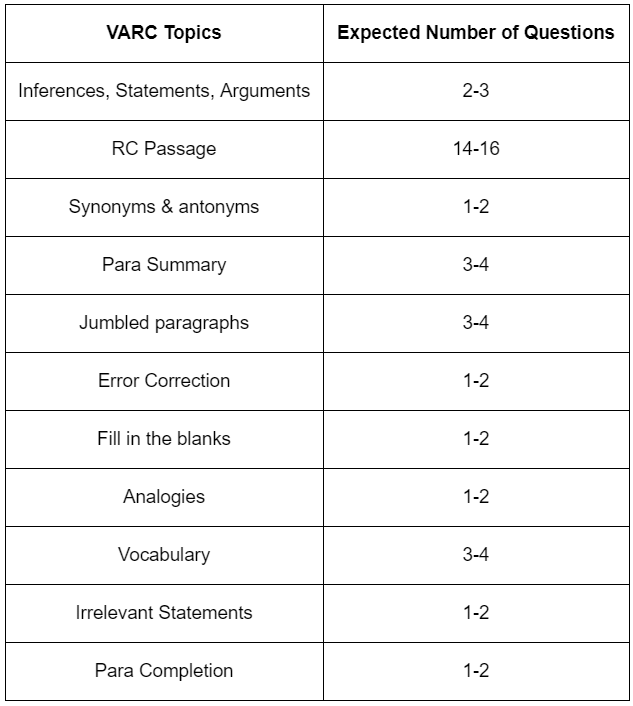
As it can be observed VARC Syllabus for CAT is now primarily focused on 5 topics:
- Reading Comprehension
- Para Summary
- Para Jumbles
- Inferences, Statements and Arguments
- Vocabulary
Your preparation should be focused around these 5 topics of VARC CAT Syllabus 2024.
Since Reading Comprehension component comprises of 16 out of 24 questions in the VARC section, it is imperative that you practice a lot RCs.
Since RC comprises of 16 question out of 24 in the VARC sections, it is imperative that you take a deeper look into the types of Reading Comprehension questions that you can face in the CAT Exam.
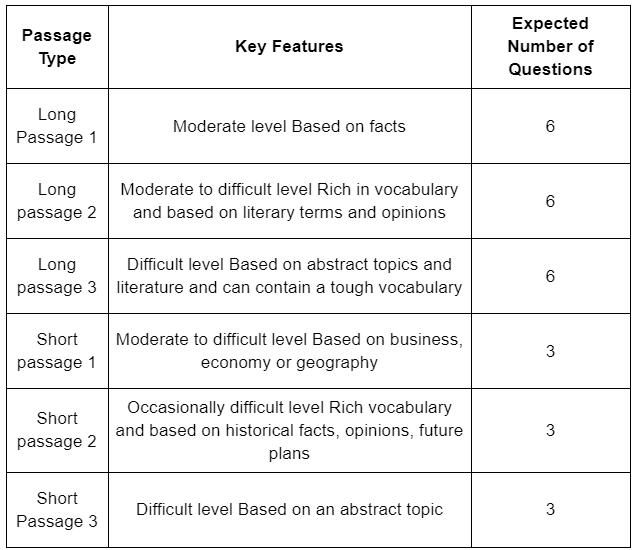
The overall level of difficulty of the CAT Verbal Ability & Reading Comprehension section is moderately difficult and this section will be time-consuming.
Given the significance of Reading Comprehension in the VARC section, explore the 100+ RC course offered by EduRev.
Also Read: How to Prepare for Verbal Ability and Reading Comprehension (VARC)?
The next section you will come across in the CAT exam is the Data interpretation and Logical Reasoning section.
2. Data Interpretation & Logical Reasoning (DILR)
- As per CAT Exam Pattern 2024, a total of 20 questions worth 60 marks were asked from CAT Syllabus for DILR.
- CAT DILR Question Paper has questions in the form of sets. Last year, there were 4 DILR sets; 2 sets with 6 questions each, and 2 with 4 questions each.
- Questions from CAT Logical Reasoning Syllabus are asked from topics like blood relations, seating arrangements, puzzles, etc., and in CAT DI, questions are based on data represented in tables, charts, etc. Also Check CAT Cut off
A detailed topic-wise distribution of the DILR syllabus is given below:
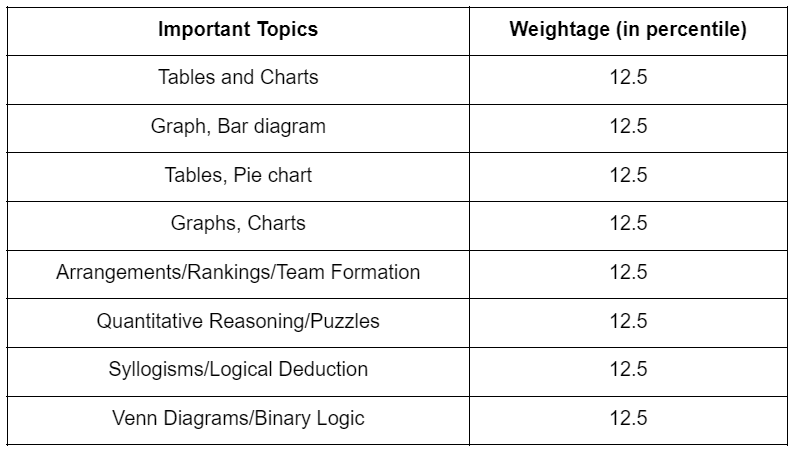 All the topics in DILR are equally important because they carry equal weightage. The topics are - Tables and Charts, Graph, Bar diagram, Pie chart, Arrangements/Rankings/Team Formation, Quantitative Reasoning/Puzzles, Syllogisms/Logical Deduction, and Venn Diagrams/Binary Logic.
All the topics in DILR are equally important because they carry equal weightage. The topics are - Tables and Charts, Graph, Bar diagram, Pie chart, Arrangements/Rankings/Team Formation, Quantitative Reasoning/Puzzles, Syllogisms/Logical Deduction, and Venn Diagrams/Binary Logic.
- It is recommended to start with a generic topic like Pie Chart, Tables & Venn Diagrams Diagrams & others. It helps you get tuned to the DILR section from the perspective of how you start looking at data sets, and the conclusions you derive from them.
- Data Interpretation (DI) is considered a bit more time-consuming. Start practicing on DI questions. Use approximation techniques for quick calculations. You can practice them here.
Now the last section you will encounter in the CAT exam is the Quantitative Aptitude.
3. Quantitative Aptitude (QA)
- Based on the changes introduced in CAT Exam Pattern in the year 2021, a total of 22 questions worth 66 marks can be asked from CAT Exam 2024 Syllabus for Quantitative Aptitude.
- As per CAT Exam 2024 QA marking scheme, 3 marks will be awarded for every correct answer and 1 mark will be deducted for every incorrect answer.
- In Quantitative Aptitude section of CAT 2024 comprised 14 MCQs and 8 TITA-type questions, and attempting 16-17 questions was considered good.
- CAT Quantitative Aptitude Preparation should begin early as it requires more practice and focus to learn various formulas, tips & tricks of solving mathematical problems in less time.
The CAT's quantitative aptitude portion is a separate section that exclusively includes numerical-based inquiries from various mathematic disciplines.
The complete Quantitative Aptitude section comprises of mainly 5 topics, which are:
- Basic Arithmetic
- Algebra
- Number System
- Geometry & Mensuration
- Modern Maths
The distribution of questions on these topics varies every year. A tentative marks distribution graph of quantitative topics is given below.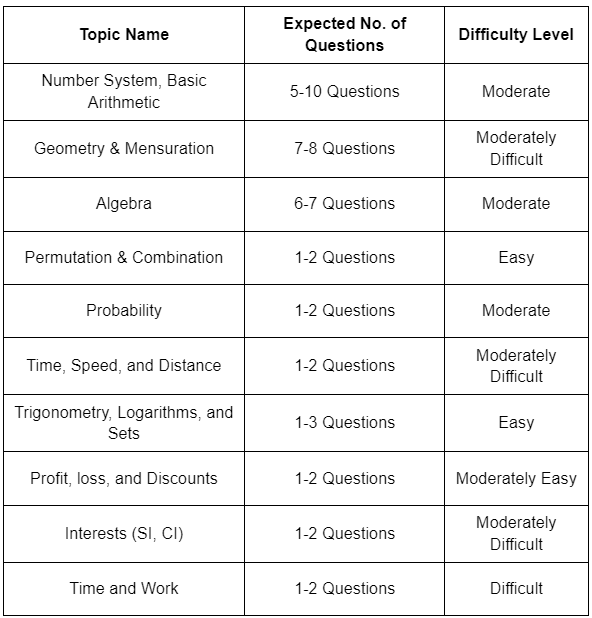
- It is evident from the chart that Arithmetic is one of the most significant test topics for the CAT, and 5 to 10 questions on it are asked repeatedly each year.
- There are about 6-8 TITA questions (Non-MCQs) in this portion, and the candidates must type in their responses.
- Overall, the quantitative aptitude component of the CAT ranges in complexity from easy to fairly challenging; however, with sufficient preparation with EduRev and review of the syllabus subjects, the questions may be answered with ease.
EduRev provides you with step by step guide on How to prepare for Quantitative Aptitude for CAT along with tips and strategies which might come in handy on exam day.
EduRev also offers a comprehensive CAT Preparation course that covers all the topics from the CAT syllabus. This material is designed to help the candidate understand the concepts, prepare for the exam, and practice the questions. The material is available in the form of Videos, Documents and Tests.
What is the marking scheme for CAT Exam?
It is important to know the CAT marking scheme before attempting the exam so that you can select which questions to answer and which ones to skip.
- According to the most recent CAT Exam Pattern 2024, there are different marking scheme for MCQ and TITA questions.
- Both MCQs and Non-MCQs will provide 3 points for each right response.
- Only MCQ questions are subject to negative marking in the CAT.
- 1 mark will be deducted for every wrong answer in MCQ Questions.
- There is no negative marking for TITA and unattempted questions.
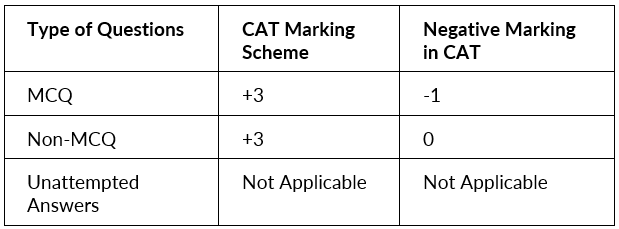 You may start developing a plan to ace each part now that you are completely informed of the CAT test format 2024. Although the most recent modifications are significant, it is not particularly difficult to adjust to them.
You may start developing a plan to ace each part now that you are completely informed of the CAT test format 2024. Although the most recent modifications are significant, it is not particularly difficult to adjust to them.
The fundamentals of CAT preparation have not changed.
CAT Exam 2024: Important Points About Test Process
- During the exam, candidates are permitted to use an on-screen calculator for computations.
- A on screen clock on the computer screen is provided to help monitor time.
- Rough work can be completed on provided sheets of paper, which must be submitted at the end of the exam.
- Starting the test before the designated time is not allowed and the computer screen will only become active after the invigilator's announcement.
- Candidates must remain seated at their assigned seat, failure to do so will result in disqualification from the exam.
- Candidates will not be allowed to switch from one section to another while answering questions in one section.
How to Mark Answers in CAT Question Paper 2024?
The CAT Exam is conducted in Computer Based Test mode, which means candidates have to enter their answers on a computer system with the help of the computer mouse or key board. Those appearing for CAT exam for the first time must keep in mind the following:
For each CAT question, candidates will see four options as answers and the following buttons on the computer screen. They will have to select an option and click on one of the following options to move to next question:
- Save and Next
- Clear Response
- Mark for Review and Next
Whatever option the candidate selects, it will be represented in the following colours:

What’s New in CAT Exam Pattern 2024?
As of now, the conducting authority has declared no changes in CAT Exam Pattern for 2024. The CAT Exam Pattern 2024 is likely to remain the same as it was for CAT 2024.
We will update the latest data if anything is declared regarding CAT Exam Pattern 2024.
Following are the key highlights of the CAT Exam 2024:
- The exam was conducted in 3 slots; Morning, Afternoon and Evening
- Time Duration of CAT Exam: 2 Hours
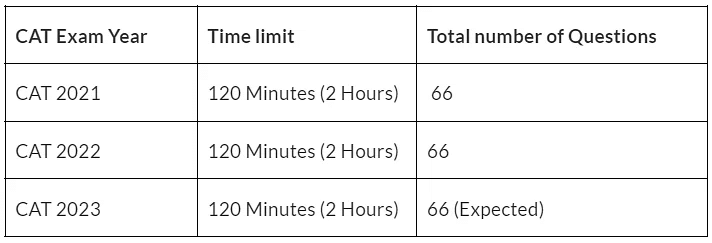
- Total Number of Questions: 66 questions
- Types of Questions: MCQs and Non MCQs
- Marking Scheme: +3 for every correct answer, -1 for incorrect MCQ and no negative marking for Non-MCQs
- There was no change in the CAT Testing Mode.
For the last two years, a total of 66 questions have been noticed. IIMs propose to keep the same number of questions in CAT Exam 2024 as well.
Year-Wise Changes in CAT Exam Pattern
Previously, the CAT Exam was done on paper; the Computer-Based Test was introduced in the year 2009.
The CAT Exam Pattern saw several changes as a result of COVID-19, including an increase in the number of questions and a reduction in the time allotted for each section from 60 to 40 minutes.
Take note of the CAT Exam Pattern changes from 2019 to 2021. The CAT Pattern varied somewhat from 2015 to 2019.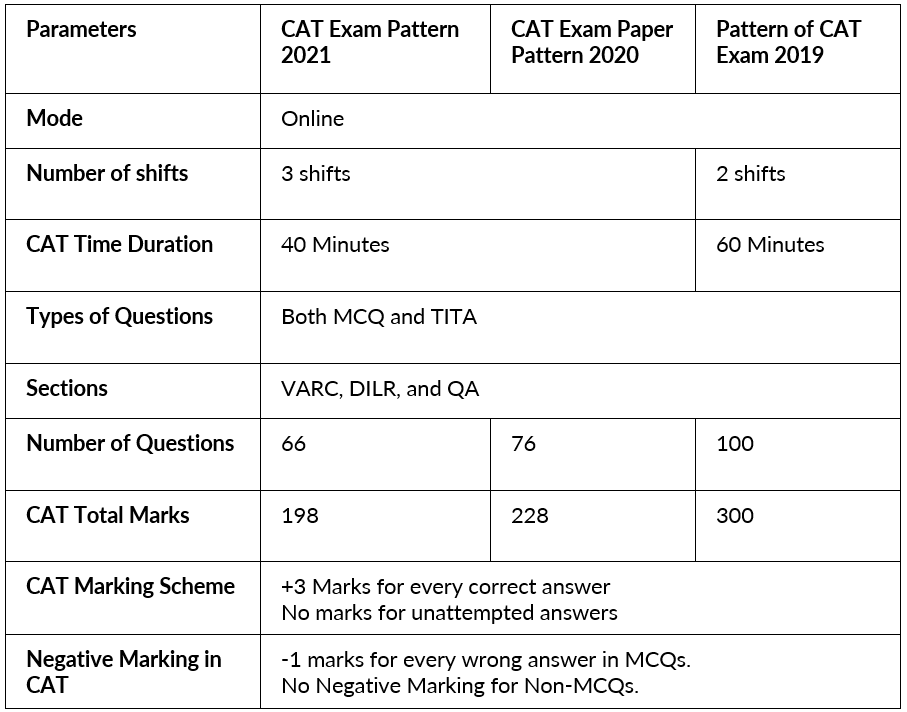
A candidate while preparing for CAT exam also considers giving other Non-CAT exams. Therefore, it is imperative that you know what is the pattern of other MBA exams.
EduRev experts have prepared a brief comparison of CAT Exam pattern with other MBA Exam Pattern.
CAT Exam Pattern vs Other MBA Exams
The CAT 2024 Exam Pattern was significantly different from the exam patterns of other MBA examinations. Experts at EduRev have described the key distinctions between the CAT Exam Pattern and other MBA Exams which will help you make an informed choice.
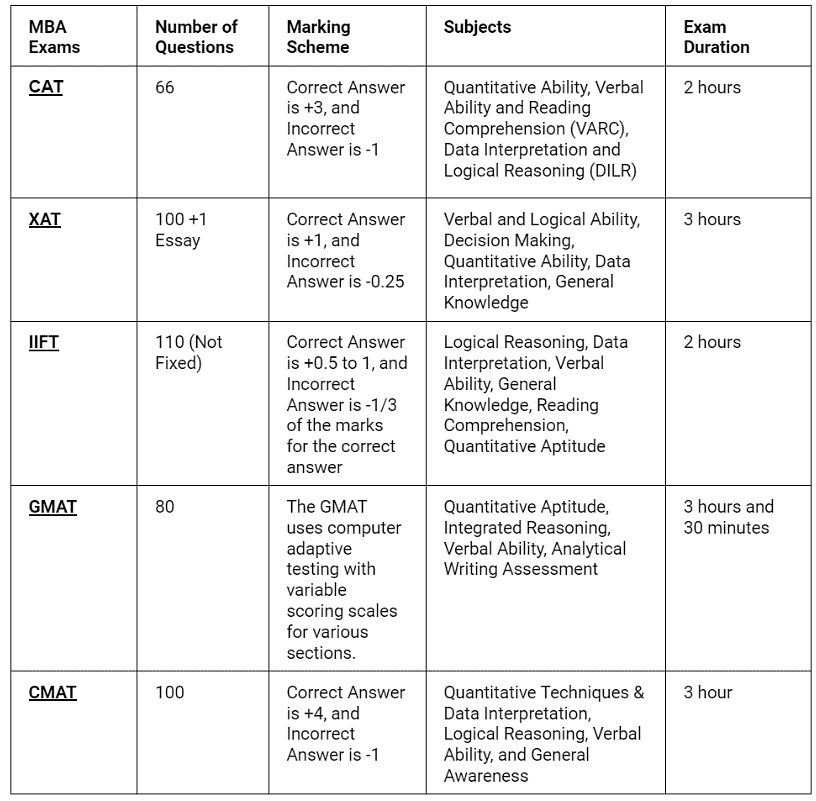
Check out the Non-CAT Mock Tests Series from the below table.
CAT Syllabus 2024
Understanding the exam pattern is effective only if the candidate is familiar with the syllabus of CAT Exam 2024 as well. The strategy that the candidate will employ to take on CAT will be influenced by both, the exam pattern and syllabus.
EduRev provides you with a comprehensive list of the topics that are covered in the CAT Syllabus and the weightage of each topic.
EduRev also provides the strategies and techniques to help prepare for the Common Admission Test (CAT). Experts at EduRev provide you with the step by step guide which will help you to prepare for different sections of the exam.
Frequently Asked Questions (FAQs) related to CAT Exam Pattern 2024
Is CAT exam easy or tough?
The difficulty of the CAT Exam can vary depending on a person's individual strengths and weaknesses, as well as the level of preparation they have done. In general, the CAT is considered to be a challenging exam as it tests a wide range of skills and knowledge in various areas such as quantitative ability, data interpretation, verbal ability and logical reasoning. It also has a high level of competition with a large number of applicants appearing for a limited number of seats. Therefore, it is important to have a good study plan and practice regularly to achieve a good score.
Edurev's CAT preparation course provides comprehensive and up-to-date study materials, online tests and mock exams, as well as guidance from experienced mentors to help you to prepare for the CAT exam. It's a great way to supplement your study plan and practice regularly to improve your chances of success on the exam.
How many papers are there in CAT exam?
The CAT (Common Admission Test) is a computer-based test that is conducted in a single day, usually in the last week of November.
The exam is scheduled in different time slots, usually in the morning, afternoon and evening to accommodate a large number of candidates.
The exact centre will vary according to the preferences given by the candidate. The candidates should check the official website for specific details.
What is the pass score for CAT?
The Common Admission Test (CAT) does not have a minimum qualifying score for candidates to pass the exam. Instead, the test scores are used to rank candidates in relation to one another. However, different business schools and management institutes use the CAT scores in different ways to evaluate candidates for admission. Each B-school sets its own cut-off score, which is the minimum score required for a candidate to be considered for admission.
The top B-schools in India, such as the Indian Institutes of Management (IIMs), generally have a higher cut-off score for admission. These top B-schools typically set a cut-off score of 90 percentile or above, which means that only the top 10% of candidates who take the CAT will be considered for admission. This is a reflection of the high level of competition for a limited number of seats at these prestigious institutes.
Is calculator allowed in CAT?
The Common Admission Test (CAT) is a computer-based test and as such, the use of a physical calculator is not permitted at the test center. This is to ensure that all candidates have a level playing field during the test and to prevent any cheating or unfair advantage.
However, to assist the candidates in their calculations, an on-screen calculator is provided within the test interface. This on-screen calculator is designed to perform basic mathematical functions such as addition, subtraction, multiplication, and division. It also includes other advanced functions such as square root, percentage, and trigonometric functions. The on-screen calculator is accessible throughout the test and can be used for both the Quantitative Ability (QA) and Data Interpretation and Logical Reasoning (DILR) sections.
FAQs on CAT Exam Pattern 2024: Section-Wise CAT Exam Pattern for VARC, DILR & QA - Marking Scheme
| 1. What is the full form of the CAT Exam and who conducts it? |  |
| 2. What are the main sections in the CAT Exam and how are they structured? |  |
| 3. How is the marking scheme structured for the CAT Exam? |  |
| 4. What are some important points to remember about the CAT Exam process? |  |
| 5. How does the CAT Exam pattern differ from other MBA entrance exams? |  |

|
Explore Courses for CAT exam
|

|


















